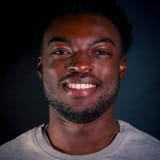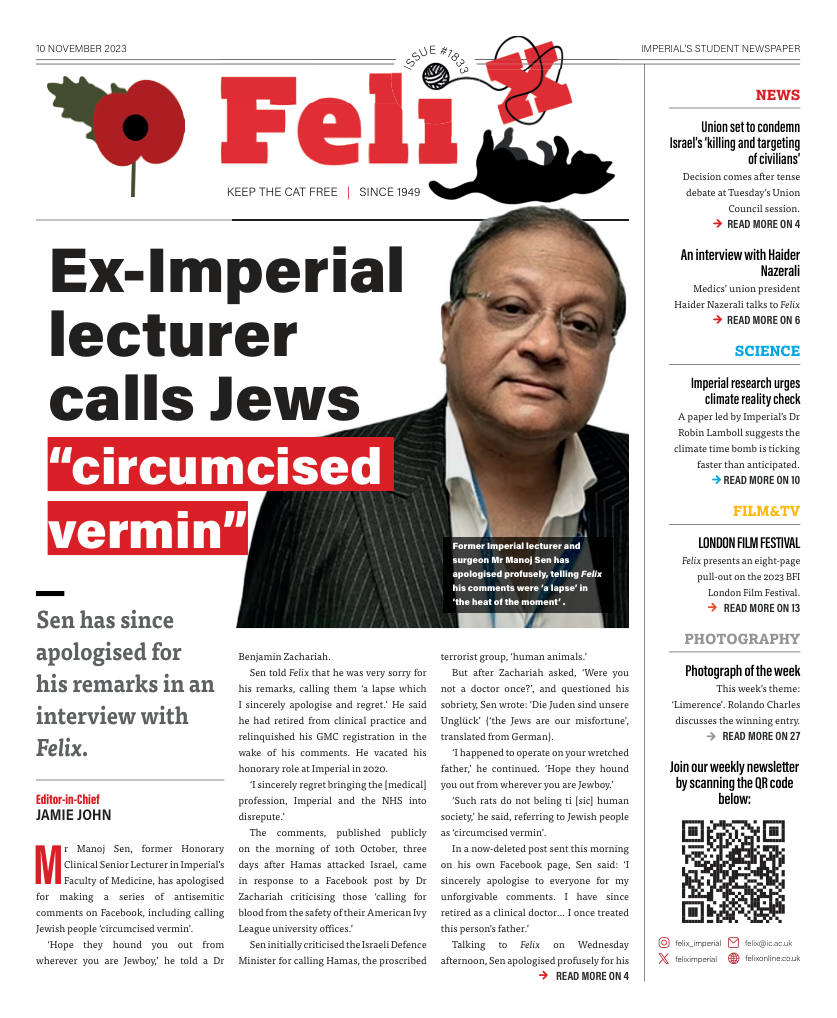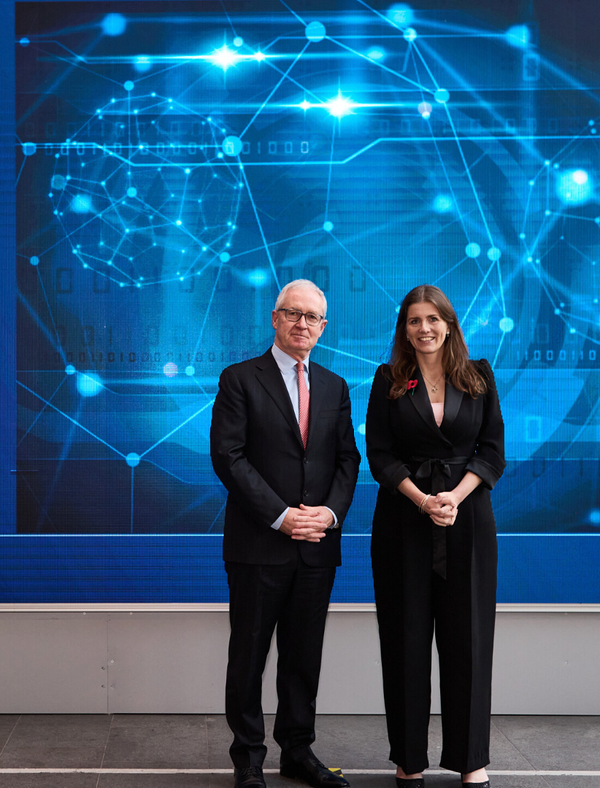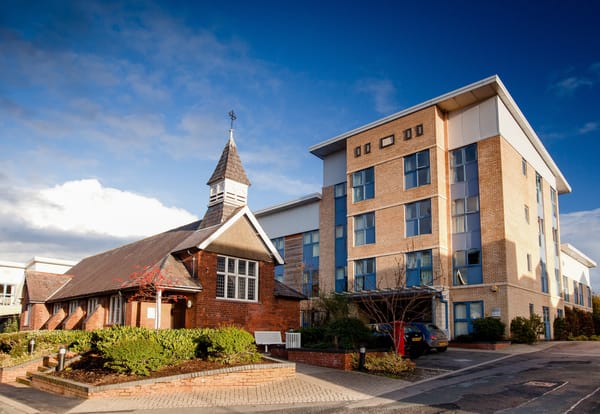The OT Interviews: Haider Nazerali, ICSMSU President
In this series, Felix talks to the Union’s sabbatical officers. This week: Haider Nazerali, ICSMSU President.
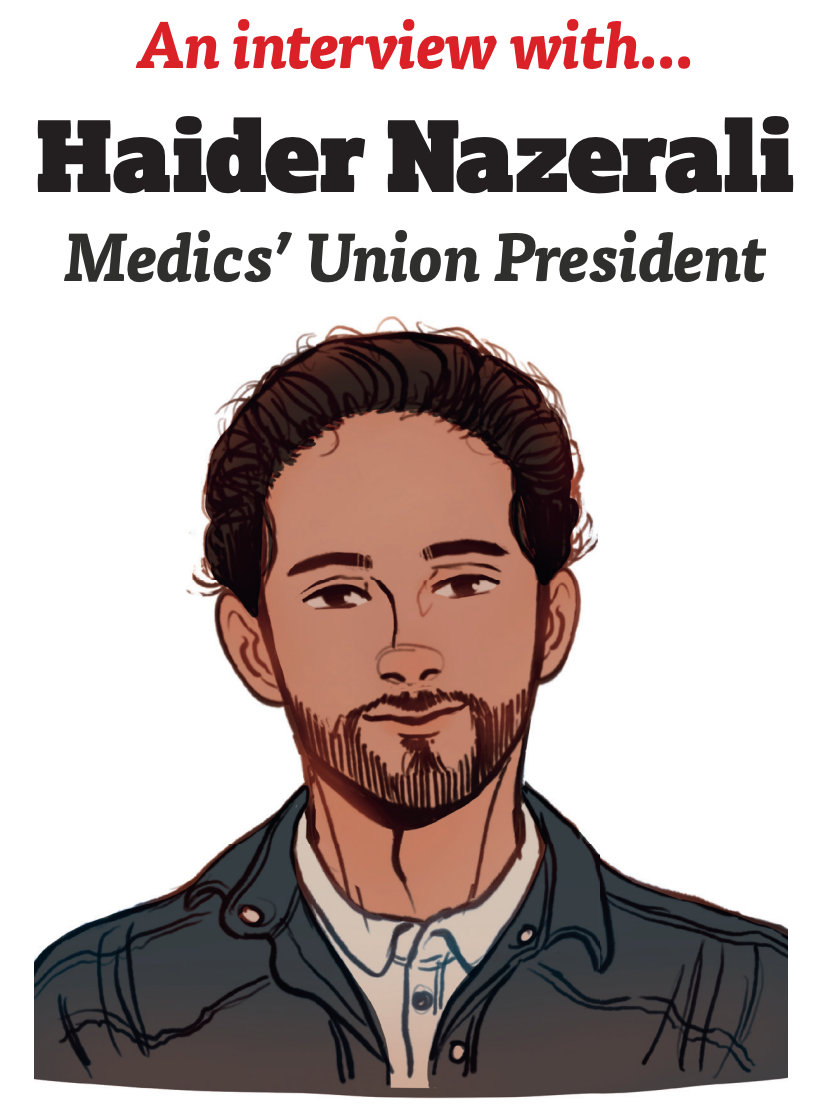
This is my first time being here,” Haider comments. We are in the rear end of the library on the second floor of Reynolds Building, at a hub of student culture in the School of Medicine’s Charing Cross campus based at Hammersmith. The doors of the Brian Drewe Lecture Theatre, capable of hosting entire Medicine cohorts, lie on its mezzanine level, and just two floors below us, the finishing touches are being made for the reopening of the Bar & Café, host to many a raucous Sports Night Sports Night, following its £1.6 million refurbishment.
This interview is scheduled to take 45 minutes – about the time it takes for Haider to arrive. When he does, however, he is apologetic and graceful in his excuse, related to the Union undoubtedly.
Ice (verb). To take away the main ideas, concerns, and expectations from a conversation (typically used within a clinical context). Used in a sentence: ‘Did you remember to ice that patient?’
Haider Nazerali, having just completed an intercalated degree in Humanities, Philosophy and Law program at Imperial, is only two months into his role as the new Imperial College School of Medicine Student Union (ICSMSU) President. His journey to the role, however, was not as straightforward as you might expect.
The end of Spring elections in the last academic year saw a notable position unfilled in the Student Union: the President. “I know they spoke to the current Deputy President,” he reflects, “but he wasn’t keen on taking a year out.”
He persists in his use of the third person in describing an ill-de ned role of the School of Medicine in prompting a candidate for position of President. He also, however, talks of conversations with previous presidents in making his decision. “I spoke to the most recent president when I was in fourth year when no one had run for it,” he says, “and eventually came to a decision.”
Now he sits before me. He is gentle but has precise affect, and I am tasked to draw the motivations or aspirations for the year in this interview, or ice him, as I call it.
Come summer, Haider is unopposed in his candidacy for President. His manifesto pro le is saturated by a bright yellow hoodie and saccharine aura – one that pervades the air as we speak. He vows to create an environment where “[all students] feels comfortable and empowered to try new things”, and to improve the efficiency of the student union’s projects.
Having served as Sites & Services Officer for two years within the Student Union itself, he would be the first to admit the role of President represents a much greater level of responsibility. I am keen to understand some of the tenets behind these ambitions.
The School of Medicine is comprised of the Medical Biosciences BSc and Medicine BSc courses. Haider is responsible for representing all these students, and overseeing a 23-person committee across the six branches of the Union itself.
“It’s about 2,500 students, between the six years of medicine, and the three to four years of BMB. And that also includes any external intercalators,” he says, describing the scope of responsibility. Haider wears none of this, maintaining a calm demeanour despite the enormity his job entails. “We now have induction talks with them as well as with the medical students,” he adds.
“Traditionally, a lot of our events have been medic-centric, so we’re trying to include the [Medical Bioscientists] a lot more,” he elaborates. “[The Reynolds Show] will now feature a more lab/science-themed station, whereas traditionally they were all medical procedure-based,” he mentions.
In all, Haider lists four goals for the year:
- Establishing a clinical skills lab for medical students for students to practise ad-hoc
- Embedding environmental sustainability in all the projects undertaken by the Union
- Developing an improved culture and identity at ICSMU for all students
- Ensuring the recently refurbish Reynolds Bar & Café creates a space that meets the needs of ICSM students
We have time to delve into two of these. “One thing that is starting to become apparent is in doing things like including BMB is the lack of knowledge we have about certain ner details of the course,” he says. “An example of such is how do we make freshers accessible to those students who are under-18, which isn’t an issue in Medicine due to legal requirements to be above 18 to start the degree.”
He is quick to move onto his next point: student spaces. “We’ll be bringing some of the old memorabilia from the Saint Mary’s Common Room into SAF,” he begins, “we’re redoing the Charing Cross [common room] later this year after the Reynolds refurbishment.”
Only two days before this, in a joint email with Haider, the School’s communications team announced: “Further improvements to the Reynolds Building have been made possible through the support of the St Mary’s sale funds[.]”
The sale of the St Mary’s Hospital branch of the medical school provoked widespread indignation among the student body. At the heart of the discontent was a lack of prior student consultation before its announcement. This followed a string of similar decisions made over the years. Though it took place during the tenure of his predecessor, it is now in Haider’s role to handle the aftermath of the sale.
“How do you view yourself as being able to influence policy and decision-making of Faculty, as a result of the impact of the sale?”
Haider stops and pauses to think for a moment. “Now I have to answer like a politician,” he whispers in a quiet confession. It is a discreet yet noteworthy response.
“The School of Medicine and the Faculty of Medicine do tend to be responsive to student feedback, and they often try and include us in whatever decisions they can,” he response, “I believe in the recent NSS we had one of the highest like marks as a faculty.” He is referencing data from the recent National Student Survey. Notably, the School of Medicine achieved a score of 78% for its ‘student voice’.
“That is thanks to the Faculty really listening to us and taking what we believe and want on board. There are always student consultations when it comes to anything. So I think we do have a very large scope to influence these decisions.”
I ask about some of the challenges he expects to face.
We have the upcoming general election,” he mentions, “what’s interesting is to see is how the Junior Doctor and Consultant Strikes are a big issue and are affecting our students quite heavily. The stance and advice from Faculty is constantly shifting regarding that because as the strikes continue, as will its impact on education continue to be seen,” he goes on.
I want to know if a significant challenge for the student body in the past, namely the COVID-19 pandemic, still raises any concerns. “Have we got past the pandemic as a student body?” I ask him.
“We are returning closer to a prepandemic level of resits and exam-fails, I do believe there are still sentiments of people struggling with their mental health.” He highlights the key relationship that the Student Union has with the Welfare Office in being able to help students. “We are still supporting people.”
It is now just past 1pm, and I am wary of not extending the interview past its scheduled end. The last part of taking ice from him – asking him for his expectations – is one I am unable to accomplish in the short time we have. If anything, it is a question directed towards the wider student body as much as it is towards him: what are our expectations of Haider as medics union president?
Though he does appear hesitant to challenge the School of Medicine, his existing bank of experience built throughout his time in the medical school inspires confidence.
“I think the last two months have highlighted that I have actually learned a lot over the last four years of doing society positions. I do actually know quite a lot about different things students are experiencing.”
As our conversation draws to a close, I manage to ask one finnal question:
“I look forward to this one thing waking up every morning as the new ICSMSU president?”
“You get a free glass of Coke from FiveSixEight!” he shoots.
“I will take that!” I laugh in equal response. A certain balance between comedy and truth that I have yet to full placed.

